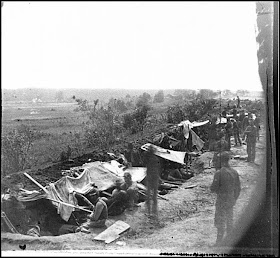This entry is from The Campaigns of Walker's Texas division by Joseph P. Blessington, member of the16th Texas Vol. Infantry
In this entry Blessington describes the various "uniforms" the men in his regiment wore, and the beards they donned. They must have been quite a sight.
May 31, 1863, In the Mississippi bottoms
"While we remained encamped in the Mississippi bottoms, Falstaff's ragged regiment was well uniformed in comparison with our troops. No two were costumed with any attempt at uniformity, and each individual stood forth a decided character. But few of the troops had shaved for weeks, and, as a consequence, there was a large and general assortment of unbrushed black, gray, red, and sandy beards, as well as ferocious mustaches and whiskers enough to rig out an army of West India buccaneers. A more brigandish set of Anglo-Saxon forces has never been collected.
Then as to costume, it is utterly impossible to paint the variety our division presented. Here would be a fellow dressed in homespun pants, with the knees out of them ; on his head might be stuck the remnant of a straw hat, while a faded Texas penitentiary cloth jacket would perhaps complete his outfit. His neighbor, very likely, was arrayed in breeches made out of some cast-off blanket, with a dyed shirt as black as the ace of spades, and no hat at all. Then would come a man with a woolen hat made like a pyramid, sitting jauntily upon his head, while, to introduce his style of hat, he had it covered over with assorted buttons ; and, to top the climax, had a red tassel sewed on top. Notwithstanding his gaudy hat, a part of a shirt, and occasional fragments only of what had once been a pair of military pantaloons, made up the rest of his attire.
But, singular as it may seem, there could hardly be found a merrier, I might be going too far in saying a happier, set of men in Christendom. Our very looks bred good humor ; for there was something irresistibly ludicrous in the appearance of each man a quaint solemnity and droll gravity of countenance, which would elicit some facetious and good-natured remark from his neighbor. The comic and eccentric were strangely mingled with the tragic and melodramatic ; but the former predominated to a degree that completely stifled any pathetic feelings which might otherwise have arisen, and induced us to laugh rather than cry at the forlorn but fantastic figure each one presented in the moving panorama.





























